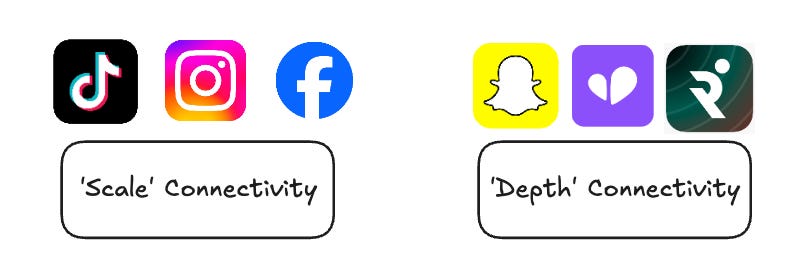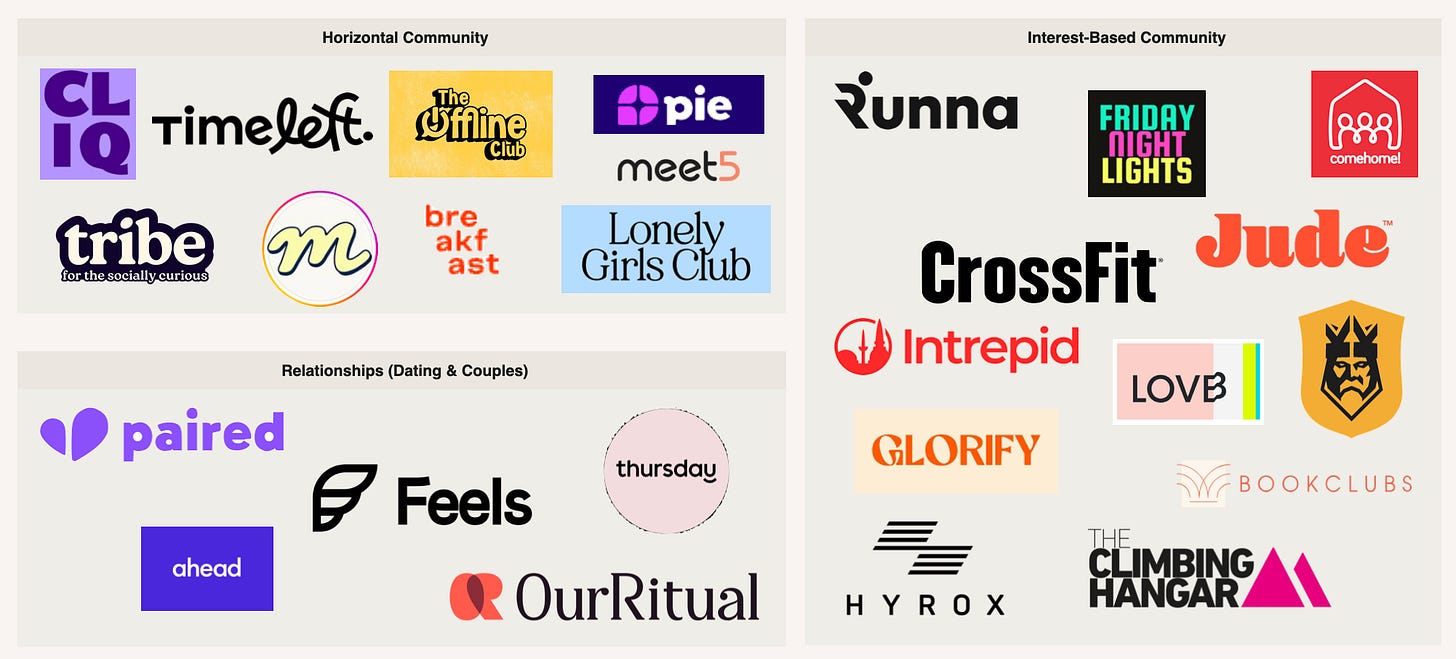Max wrote a great piece on in-person communities - a subject that’s been on our minds for quite some time. We figured this was the perfect moment to build on those ideas and put our own reflections down on ‘paper’.
The thesis is simple:
Face-to-face human interaction is a fundamental human need.
The first social wave has improved certain areas of connectivity (’scale connectivity’), but neglected the quality and in-person pieces of connection (’depth connectivity’).
Our hypothesis is that there will be a company that shifts the direction of travel back towards increased connectivity/human interaction.
We care about social because human connectivity is one the single most important determinants of health 🗞️
After reading The Good Life last year, we started doing more work on relationships and the power of connectivity in the context of human health.
Close relationships are the single most powerful predictor of happiness and longevity. This 80+ year study found that the quality of people’s relationships at age 50 could predict their physical health at age 80.
People who report strong social support tend to have better immune function and cope more effectively with stress. In times of personal struggle, a supportive network can help buffer the negative physiological impacts of stress.
Chronic loneliness can be as harmful to health as smoking up to 15 cigarettes a day. It’s also associated with a 26–50% increased risk of early mortality, depending on the study.
Loneliness increases risks for conditions like heart disease and stroke, and it’s a major risk factor for depression, anxiety, and even cognitive decline in older adults.
At Eka, we have backed Paired which helps couples stay in love using daily conversation starters and expert advice. We are always really excited to read the app reviews to see how Paired’s impact is positively benefitting couple’s lives (see below!):
My partner and I love this app! We are constantly able to connect and interact with each other, while falling in love over and over again. Honestly, one of the best apps we’ve ever used together! - Anonymous, 4 April 2025, iOS App Store
My husband and I are grateful to the creators of this app because the questions and timeline album really enhance our relationship. We’ve been together almost 20yrs and this is an intricate part of what rekindled and strengthened our marriage. We’ve only had 1 separation in all this time and we came upon this app during that phase. I like to think this was a thread, that helped us get back together. - Anonymous, 26 March 2025, iOS App Store
The first wave of digital platforms increased scale connectivity but neglected the depth of connectivity.
The first ‘wave’ of social media platforms (Facebook, Instagram) helped us connect with many more people than we would have been able to in a non-digital world.
Don’t get me wrong, I think there is still huge value in this connectivity. I grew up far from my ‘home’ country and used Skype and the early days of Facebook to keep in touch with friends and family and benefitted hugely from the ‘scale’ connectivity which these platforms offered.
But what this has led to in the current form is a de-prioritisation of ‘depth’ connectivity over ‘scale’ connectivity.
We are (and will forever remain) human beings who (almost always) require interaction with other human beings in a physical space. As more and more of our lives become digitised, this places more and more strain & pressure on how ‘real’ life has to be managed.
There is an incredible opportunity to create a new platform in this ‘offline’, ‘slow’ world to embrace the counter current we’re seeing across society and harness human physical interaction.
We have all seen the stats of digitisation & loneliness.
The impact of the current social wave is fewer deep relationships and an unmet basic need.
1. We are spending less time with other people
This data will likely be skewed from Covid impact, but the overall direction of travel is clear: we are spending less time with friends, families, and just ‘other people’.
2. This trend has continued post-pandemic
A Gallup poll showed that loneliness had dipped post-pandemic, but was recently on the rise again post 2024. It is difficult to say what is a ‘normalised’ world post Covid but directionally this is on the rise.
3. Part of our loneliness comes from increased time on socials
Loneliness & mental health come hand in hand.
Increasing time on socials means less time available for in-person. Socials have also moved away from ‘friend’ feeds in the early days of Facebook / Instagram, to ‘content’ & ‘influencer’ based feeds across Instagram & TikTok (Snapchat is the exception).
4. There is a real desire to go out & meet people.
People want to meet people (’where to meet people’).
They don’t want to identify with ‘i am sad’, or ‘i feel lonely’.
5. Communities constantly evolve and aren’t a new thing
Communities have been present for ages. Communities were often hyper local (religious, commerce, other), but became larger and larger until they lost sight of the local & in-person nature of connection.
We are seeing sprinkles of Phase 3 in various sports communities (shoutout to Runna in the Eka portfolio, or Verlinvest’s investment in the Climbing Hangar).
There are some exciting companies tackling community
Runna: personalised running plans with a vibrant community.
Thursday: biggest IRL dating app in the world.
Cliq: connecting with like-minded individuals.
Tribe: tribe is social community where our members work, play and connect together.
GalsFC: couch to 5k but for women's football.
Lonely Girls Club: helping women connect, make friends and make life less lonely.
✍🏽 Week in Impact Articles
Monday: The $100 Trillion Disruption: The Unforeseen Economic Earthquake
Tuesday: Massachusetts home-electrification pilot could offer a national model
Wednesday: Claude goes to college
Thursday: ⚖️ Utah makes app stores responsible for age verification
Friday: I Hate How Great IRL Is
👋 Getting in Touch
If you’re looking for funding, you can get in touch here.
Don’t be shy, get in touch on LinkedIn or on our Website 🎉.
We are open to feedback: let us know what more you’d like to hear about 💪.













